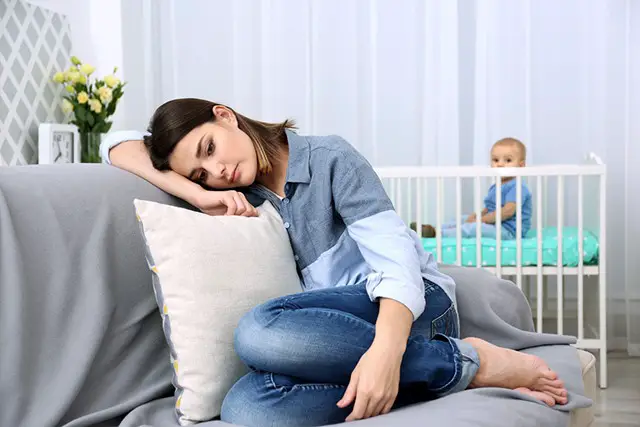Friday February 15, 2019 By: Dr. Mona AbuHamda

Throughout history, women were taught that the main purpose of their existence is to bear children, and that biologically, they are designed for that one “inevitable” duty. Motherhood is idealized, and most women have maternal fantasies as part of their future plans. Females’ coming-of-age encounter tremendous pressure to “find a husband,” and anyone and everyone are involved in finding them “a suitor.” Girls/women are constantly reminded that their biological clocks are ticking, and of the immeasurable rewards of being a wife and a mother.
Without exception, once couples get married, parents on both sides begin pressing for a grandchild (and uncles, aunts, cousins, neighbors and even strangers). Most young couples do not even consider NOT having children. It is a “fact of life” and we all MUST follow in our parents’ footsteps and their grandparents and great grandparents before them because after all, procreation and populating the earth is our ultimate objective as a race.
There is a myth that every woman will innately know what to do and will fall in love with the baby and her new role. No one shares the reality that it is not quite this simple. That falling in love with the baby is a process and that pregnancy, childbirth and mothering is a most challenging experience. No one warns of the first four to six months of agony, sleeplessness, physical and emotional pain. Another overlooked fact is the transformation of the woman’s identity from being herself to being defined by her child (being her baby’s mother) and off course, that this baby is a final sale item not eligible for exchange or return (even if you’ve kept your receipt and the baby is in pristine condition with the tags still attached).
So here we are, the baby is finally out and the struggles begin. Within hours, a woman has to know how to feed, bath, change, love and understand her child. This task can be more challenging or less challenging based on many variables including, whether or not the pregnancy was planned, wanted, and without complications. The mother’s support system, father’s involvement, financial stability, physical health of the mother and the baby, in addition to other life circumstances, (as the gender of the baby in Egypt), can create feelings of disappointment and unhappiness due to cultural, familial and personal preferences.

Though most new mothers experience some feelings of sadness as they adjust to these changes, for many women, these “baby blues” go away within three to five days. However, there is a percentage of women who are at a higher risk of developing a serious type of depression known as Post-Partum Depression (after childbirth depression) or PPD. This depends on several factors such as personal or family history of depression, lack of support, problems with a previous childbirth, if they are younger than 20, if they have problems with alcohol or drug use, if they have an ill baby or one with special needs, or having difficulty with breastfeeding, all this, in addition to the challenges mentioned above.
Post-Partum depression is a serious mental illness that involves the brain and affects the behavior and physical health. According to the women’s health organization, one in nine new mothers in the USA has PPD. A woman can feel sad, flat, or empty and might feel unconnected to her baby as if she is not the baby’s mother. She may not love or care for the baby. These feelings can range from mild to severe.
Some of the most common symptoms include:
- Feeling restless or moody
- Feeling sad, hopeless, or overwhelmed
- Crying a lot
- Having thoughts of hurting the baby
- Having thoughts of hurting herself
- Not having any interest in the baby, not feeling connected to the baby, or feeling as if her baby is someone else’s baby
- Having no energy or motivation
- Eating too little or too much
- Sleeping too little or too much
- Having trouble focusing or making decisions
- Having memory problems
- Feeling worthless, guilty, or like a bad mother
- Losing interest or pleasure in activities she used to enjoy
- Withdrawing from friends and family
- Having headaches, aches and pains, or stomach problems that don’t go away
Some women don’t tell anyone about their symptoms. New mothers may feel embarrassed, ashamed, or guilty about feeling depressed when they are supposed to be happy. They may also worry they will be seen as bad mothers.
 In very rare cases, women can develop a severe form of PPD known as Post-Partum Psychosis (four in one-thousand new mothers in the USA). Post-Partum psychosis usually begins in the first two weeks after childbirth. It is a medical emergency. Women who have bipolar disorder or another mental health condition called Schizo-affective disorder have a higher risk of postpartum psychosis. Symptoms may include:
In very rare cases, women can develop a severe form of PPD known as Post-Partum Psychosis (four in one-thousand new mothers in the USA). Post-Partum psychosis usually begins in the first two weeks after childbirth. It is a medical emergency. Women who have bipolar disorder or another mental health condition called Schizo-affective disorder have a higher risk of postpartum psychosis. Symptoms may include:
- Seeing or hearing things that aren’t there
- Feeling confused most of the time
- Having rapid mood swings within several minutes (for example, crying hysterically, then laughing a lot, followed by extreme sadness)
- Trying to hurt herself or her baby
- Paranoia (thinking that others are focused on harming her)
- Restlessness or agitation
- Behaving recklessly or in a way that is not normal for her
What can a depressed mother (and her family) do to help?
In addition to seeking professional help (psychotherapy, group therapy, medication)
- Rest as much as you can. Sleep when the baby is sleeping.
- Don’t try to do too much or to do everything by yourself. Ask your partner, family, and friends for help.
- Make time to go out, visit friends, or spend time alone with your partner.
- Talk about your feelings with your partner, supportive family members, and friends.
- Talk with other mothers so that you can learn from their experiences.
- Exercise
- Don’t make any major life changes right after giving birth. More major life changes in addition to a new baby can cause unneeded stress. Sometimes big changes can’t be avoided. When that happens, try to arrange support and help in your new situation ahead of time.
It can also help to have a partner, a friend, or another caregiver who can take care of the baby while you are depressed.
According to a study published in Psychiatric Times journal, approximately one third of children of depressed mothers were found to have a current psychiatric symptom including disruptive behavior, anxiety and depression.
So, if you are feeling depressed during pregnancy or after having a baby, ask for help. You don’t need to suffer alone.
Resources: www.Womenshealth.gov, Psychiatric Times Journal, National Institute of Mental Health

Dr. Mona Ezzat-AbuHamda began her graduate studies at Regent’s College in London in 1993 and received her doctoral degree from the George Washington University in Washington, DC in 2003
She serves as clinical faculty at the George Washington University, school of professional psychology and held an adjunct faculty position at The Johns Hopkins University, school of business and education. In addition to her private practice in Mclean, VA. Dr. AbuHamda is an independent consultant providing clinical services at Washington Behavioral Health, a day-treatment outpatient hospital for adolescents and adults who struggle with addiction disorders
She is a native of Egypt and lives in the Washington DC Metro area with her family.
***If you liked this article, don’t forget to subscribe to our newsletter and receive our articles by email.
